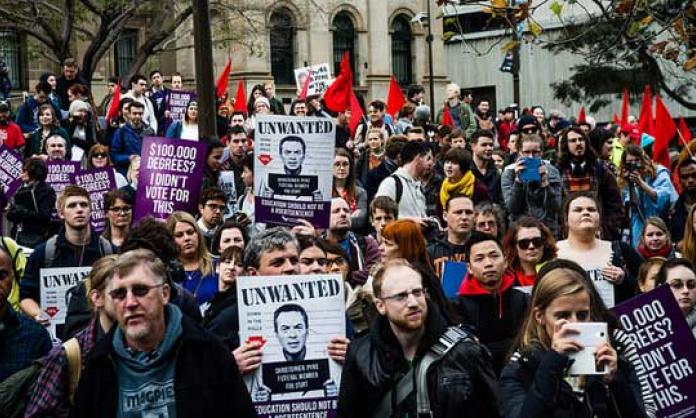Bringing in a US-style higher education model has proven more difficult than education minister Christopher Pyne and PM Tony Abbott had hoped.
For the second time in four months, Pyne’s bill to deregulate university fees has been voted down by the senate.
This is a victory for students. From his first days on the job, Pyne made it clear that he was committed to attacking students and further privatising higher education.
Fee deregulation was the centrepiece of his agenda.
The defeat of this bill is a testament to the campaign of street protests and direct actions, which has included the biggest student protests in almost 10 years and a series of face to face confrontations between students and Pyne.
The campaign has shifted public opinion. When the government’s education policy was released last May, a minority of the population opposed fee deregulation. Today it is the second most opposed measure from the 2014 Budget.
The campaign and strong public opposition have forced the Labor Party and a number of independents to oppose the legislation.
But Pyne is not giving up. He has a firm sense of entitlement and a stubborn disregard for democracy. Like a cockroach, his agenda will be difficult to expunge.
Prior to last night’s senate defeat, Pyne, like a good Hollywood villain, set the scene for a second sequel. He said that he would “never give up” and ended an interview with Today’s Karl Stefanovic with the ominous and bizarre statement: “You couldn’t kill me with an axe, Karl. And I’m going to keep coming back.”
Immediately after the bill was voted down, he said: “We will therefore bring back the higher education reform package for the parliament to consider. We will not give up. This reform is too important.”
It seems unlikely that the fee deregulation will get up in this parliament. It has now been voted down twice and there is realisation among many in the ruling class that this particular bill is damaged goods.
But privatising the higher education system has never been contingent on the passage of one specific bill.
It is a much larger project that can be accomplished in other ways. It is clear that significant sections of the business class are dedicated to finding a way to push ahead with market reforms.
Belinda Robinson, chief executive of the vice chancellors lobby group, Universities Australia, made this clear in a press release issued after the defeat of the bill:
“The almost year-long debate has achieved a remarkable political consensus on one critical factor – that the current state of public investment in universities is insufficient for maintaining and enhancing the quality expected by students, employers and the community.”
The Business council of Australia has recently made a similar statement:
“We cannot afford to squander any more opportunities for reform. The government should take a step back and take this chance to get the reform right. The government’s intent for the reforms is right but changes are needed to the package. It needs to now bring the right people together to get the market design, safeguards and the transition right.”
Students are already paying some of the highest fees in the OECD and two-thirds of the student population are living below the poverty line.
If we are going to block future attacks we need to maintain a focus on protest and resistance. Students need to take to the streets for the national student protest on Wednesday 25 March.
The government wants a US-style education system in Australia. Students will not be safe as long as Pyne and others are attempting to “fix” things in favour of the market.
We can scuttle these plans. Our protest-based campaign has already had two significant victories over the government.
But for these victories to be meaningful, we need to match Pyne’s determination. We need to continue the fight against privatisation, funding cuts and fee increases.
There are student protests happening in every major city on 25 March. Get in touch with your local student union for details.









